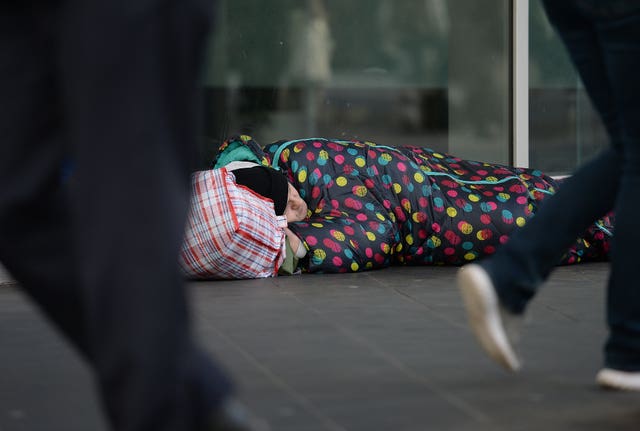Social distancing almost impossible in temporary accommodation, says Shelter
Another homelessness charity described the Government’s aid for the homeless as ‘inadequate’.

The Government needs to provide emergency support for families living in shared temporary accommodation, where it can be “almost impossible” to follow NHS isolation guidance, homelessness charity Shelter has said.
Last week, Local Government Secretary Robert Jenrick claimed 90% of rough sleepers have been offered a place to live during the coronavirus crisis, but Shelter says more needs to be done for those not on the streets.
“The Government has acted swiftly in recent weeks with strong emergency measures and funding to help people sleeping rough during the coronavirus pandemic, but homeless families in shared and one-room temporary accommodation are still waiting for the same kind of emergency support,” said Polly Neate, chief executive of Shelter.

“The trauma of homelessness is only being magnified by Coronavirus. For the thousands of families with children currently stuck in cramped emergency B&Bs and hostels, it can be almost impossible to follow NHS isolation guidance.
“These families are sharing kitchens and bathrooms with strangers, living in a single room or even sharing a bed – causing fear and anxiety levels to skyrocket for many.”
The mayor of Greater Manchester, Andy Burnham, said this week that 344 people in his area had been recorded as newly homeless and requiring accommodation since the coronavirus lockdown began.
Shelter’s call comes as another charity, Homeless Friendly, described the Government’s work to help rough sleepers during the coronavirus outbreak as “inadequate” and raised concerns over healthcare access.

Dr Zahid Chauhan, founder of Manchester-based charity Homeless Friendly, wrote to Prime Minister Boris Johnson on March 11 warning that rough sleepers’ living conditions could be the “perfect breeding ground for viruses to spread” and calling for special measures. He said he had received no response.
“I tried to make a reasonable case of saying it’s not only to protect these people who are already marginalised … but also it makes economic sense because you don’t want these people to spread the infection,” Dr Chauhan told the PA news agency.
The GP and Labour councillor’s charity focuses on encouraging GPs to allow rough sleepers into their clinics, for which he received an OBE last year.
In England, those seeking medical advice about suspected coronavirus are asked not to attend a GP practice, pharmacy or hospital and to utilise online resources or call 111, but Dr Chauhan says “most” rough sleepers do not have a phone or access to the internet.
“How are they accessing their health care facilities? This is a big unknown,” said Dr Chauhan.
“We know from speaking to people that they are struggling.
“I have to drive around because I’m a GP and I’m on call and I still see people on the street corners. I speak to them and ask them to contact services, but they say they can’t.”
Cllr David Renard, Local Government Association housing spokesman, said councils are now experiencing an urgent need for temporary accommodation.
He added that councils need the Government’s commitment that they will be given the necessary support to cope with the pandemic.
He said: “Councils have put in a monumental effort to get rough sleepers and homeless people off the street since the coronavirus outbreak, and have now managed to find housing for the vast majority of people sleeping rough.
“However, they have faced significant challenges housing large numbers of homeless people in a short space of time, which requires a joint approach with the NHS and other partners to make sure it is done in a way that minimises the public health risk.
“We urgently need national guidance for councils on how to support people in this radically-changed environment.”
A Government spokeswoman said: “We’ve given councils access to £3.2bn in funding to help them during this national emergency, including finding safe and suitable accommodation for families. Temporary accommodation is an important way of ensuring no family is without a roof over their head while dealing with the impacts of Covid-19.
“And since the beginning of the crisis, over 90% of those on the streets and known to local authorities have been offered safe accommodation – ensuring some of the most vulnerable people can stay safe during the pandemic.
“This is a remarkable achievement and the progress that we have made is the result of a collaborative effort across Government and with local authorities, health providers and charities.”





